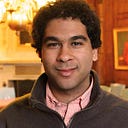Thank you for sharing your wonderful insights. This is all great. On the Ethiopian traditions — I will keep an eye out on those points. Thus far, most of the references to Ethiopia/Yemen/etc. are mainly by way of the Bible, and some Islamic theologies and histories, so I’m not entirely sure to what degree Herbert was relying on Ethiopian accounts. But we do know he was reading canonical orientalist accounts and travelogues about peoples in the Middle East and Africa, so who knows. The contrast with the other wives is interesting, though, and may pay off, given Herbert is exploring fractures within religious and cultural traditions, so the themes may fit. Reading between the lines around the other references (which I’ll get to in later entries), my current hunch is that the Sheba reference has to do with conversion from sun-worship to Judaism (since Herbert, in other contexts, seems to allude to sun-worshippers converting to Judaism, Christianity, and/or Islam) and the relationship between peoples in Ethiopia (and maybe Yemen) and Jerusalem. He may be drawing on the Druze, as many other readers have speculated about the Dune novels.
Sheba appears to be a consciousness stored in Ghanima’s collective memories (like a benign version of the Baron as Abomination for Alia). I’ll dive into these themes further as they arise in my reading.
